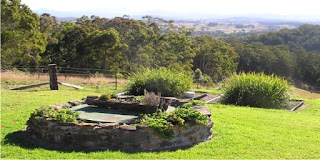Just over year ago we had a very smelly problem. Our septic system (we live on acerage and we're not connected to a reticulated sewerage system) had decided to 'pack it in'. So, after much research (and being confirmed greenies) we decided to bite the bullet and instal a REEDBED WASTEWATER SYSTEM.
What is that I hear you ask?
Reedbeds/wetlands are on-site wastewater (black and grey) treatment systems that mimic natural wetlands.
How does it work?
Treatment is by physical filtration, precipitation and biological (microbial) reduction of potential pollutants including pathogens.
Primary treatment is in a collection (septic/greywater) tank. (A composting toilet may be part of primary treatment.)
Secondary treatment is in contained polyethlene or concrete reedbeds (also known as sub-surface wetlands). The treatment substrate is gravel. Reeds are planted to help biological (microbial) and physical filtering. Solids and pathogens are reduced considerably. Nutrients are reduced and converted to useful forms.
- Physical filtration by gravel and plant roots, also settling occurs.
- Biological filtration by microbes and algae (aerobic and anerobic bacteria).
- Nutrient reduction. Plants are basically grown hydroponically in gravel (feeding on nutrients in water).
- Nutrients are convented to usable and manageable forms.
- Naturally occuring organisms feed in system, (including worms that live in top section of reedbed).
- Worms also help reduce any sludge build-up in the system (self cleaning).
Tertiary treatment occurs when the wastewater (by this stage clear) is pumped underground to our orchard.
What are the benefits?
OK, it wasn't the cheapest solution we could find but it was the best long term sustainable solution. The system has a small pump which comes on about once a day for 10-20 minutes which delivers clean water up to our orchard. It is perfectly safe to grow anything which fruits above ground so now we have organic oranges, figs, berries, apples, nectarines, cherries and more which never need watering. Also, its low maintenance, has virtually no on-going costs, is a natural process and, unlike me, improves with age! It looks great, is environmentally friendly and is re-cycling our most precious resorce - water.
Best of all, there's NO smell!
n2witive Destiny


No comments :
Post a Comment